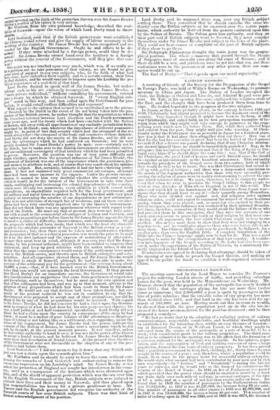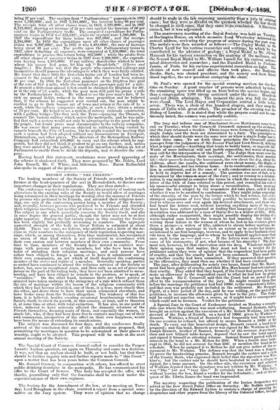METROPOLITAN RAILWAYS.
The meeting convened by the Lord Mayor to consider Mr. Pearson's project for relieving London streets of traffic and providing suburban homes for the poor, was held in the MansionhOuse on Wednesday. Mr. Pearson showed that the population of the metropolis has nearly doubled since 1811 ; that the carriages plying for hire are more than twelve times as numerous ; that 2,000,000/. a year is spent by passengers in the hire of public vehicles ; that the rateable value of city property has more than doubled since 1811, and that land in the city has been sold for up- wards of 200,000/. an acre. Having made out this increase in wealth, he showed that while the poor population pent up in the city has in- creased the house accommodation for the poorhas decreased ; and he then proposed a remedy- " He had no doubt that by the adoption of a radiating system of railway communications, respectable, comfortable, and healthful dwellings might be established for the labouring class, within an easy distance of London— say at Banstead Downs, or in Waltham Forest, to which they might be conveyed from the centre of the metropolis at a rate of from 611. to Is. a week, with considerable profit to the railway proprietors. The third reso- lution to be submitted to the meeting was to the effect that the formation of a sub-way railroad for the metropolis was desirable. In his opinion, popu- lation, and the consumption of food and clothing consequent upon a large population, formed the true basis of railway prosperity. It has been proved that a population consumed in food, fuel, clothing, &c., thirty times its own i
weight n the course of a year ; and, therefore, where a population could be found, there must be the proper scene for successful railway enterprise. He would state what automat had been contributed by poor men and by rich men respectively—by " fustian" and " broadcloth"—during the last six years to railways, and he would take as the basis of his calculations the returns of the board of Trade. In 1844 an Act of Parliament was passed which provided that the poorer class should be enabled to travel by at least one train daily over each mile of railway, in covered carriages, at the rate of hi. a mile, and at a speed of uot less than twelve miles an hour. He found that in 1852 the number of passengers by the Parliamentary trains was 23,842,000; in 18.57 it was 4,5,227,000, the increase being 89 per cent. The number of passengers in all other classes in 1852 was 49,392,000, and in 18.57 it was i 70,608000, the alma: e being 40 per cent. TL e number of miles of railway open n 1852 was 5245, and in 1857 it was 6674, the increme Tbh142/.1 i4eht: The receipts from" Parliamentary" itikliV*2 were' 1,3 ;900/., and in 1857 2,244,0001., the increase g pet tint: The reeeiptit from all other elasses were, in 1852, 5,323; .,,,and in 185i 43;753,00W. showing an increase of 26 per cent against the %Create of 66 per cent on the Parliamentary traffic. The computed expenditure for Parlia- mentary trains 1852 was 525,6487., while the receipts were l;346,090An -1857 the expenditure for these trains was 667,0007., and' the' rerce ts 2,244,0001. In 1852 the expenditure upon all other classes of paSieti r 'trains was 3,207,0007., and in 1857 it was 4,483,0001., the rate of increase being about 40 per cent. , The profits upon the Parliamentary trains in 1857, after deducting all expenses, were computed at 1,576,0007., the total expenditure to procure this return being 667,0007. • white the profits 'from all other classes of passenger trains in 1857 were 2,209,000!., the experidi- tire having been 4,483;00'W. 11 any railway shareholher wished to Iiititv 'where his money had gone, let him ask , Broadcloth," (('heers and laughter.) His, desire was that the people who constructed railways and locomotives should possess the advantages to' which they were fairly entitled. Be found that since 1814 the first-class trains out of they had been in- creased to the extent of 50 per cent, While the fares had been reduced 30 per cent. In 1811 the first-class passenger on the Brighton line paid -attlae rate of 31(7. a mile, while the second-class passenger paid a mile. At present a first-class annual ticket could be obtained for Brighton for 50/. or at the rate of ",d. a mile, while the poor man still paid his penny- a mile by , the Parliamentary train. He wiwishedto'see the poor man's fare, if he took' an annual ticket, reduced in the' tame proportion and he believed that, if the scheme he suggested were carried out, the poor might be enabled to go to their houses out of town and return at the rate of ls. a week, while the railway companies might,, at such a fare, obtain a return of 75 per cent. He hoped to see a system of subway railroads constructed, , with a gallery bridge—like that over the Tyne—spanning, the Thames, to c onnect the various railway- which enters the metropolis, and he was satis- fied that such a system -Would not only be advantageous to the great body of the People, but would prove most renumerative to the railway companies. Be was aware that many persms objected to railways being carried by tunnels beneath the City of London, but he might remind the meeting that such it system had been adopted without any inconvenience in Liverpool, Birmingham, and other places. The directors of the Metropolitan Railway Conny had subscribed 450,0007. to carry out the scheme which he sug- gested, but they did not think it prudent to :go on any further, and, unless they were assisted by the public, it was their intention to obtain an Act of Parliament to enable them to divide the deposits, and to dissolve the coin- pay. Having heard this statement, resolutiens were passed approving of•the scheme it shadowed forth. They were proposed by Mr. Lakin, Lord
John Russell, Mr. C. White, and Alderman Rose. Baron Rothschild also spoke in support of the project.



































 Previous page
Previous page